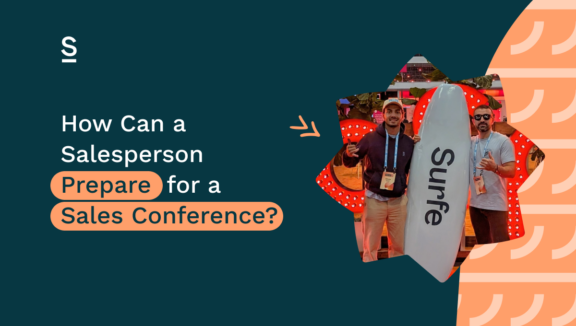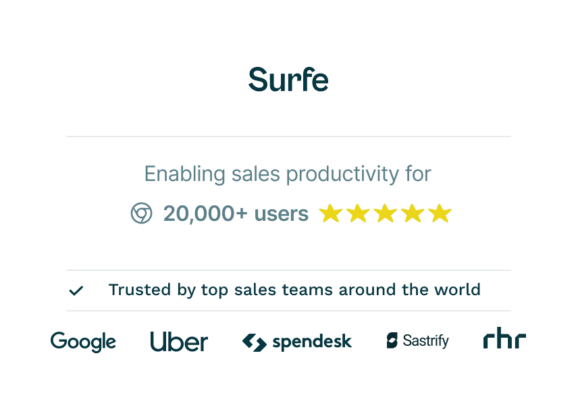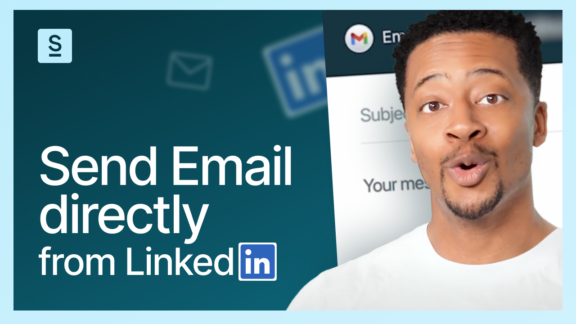How Can a Salesperson Prepare for a Sales Conference?

Hey you – yes, you!
Got a question for you.
If we offered you a magic potion that would make you well-connected, well-informed, and better at your job, would you drink it?
If you answered yes (which you obviously did), we’ve got a follow-up question. How many sales conferences have you attended recently?
Here’s the thing: we don’t have the powers to mix magic potions (yet), but going to a sales conference is going to have pretty much the same effect. Each one is an amazing opportunity for networking, learning, and boosting sales – in fact, 90% of buyers have used them to meet salespeople and learn more about products – yet salespeople often sleep on them.
Taking time out of your day-to-day can feel difficult, but we promise sales conferences are worth it – providing you prepare properly, that is. And funnily enough, what you need to do before, during and after each sales conference is exactly what we’re talking about today:
Intrigued? Let’s get started.
Set Clear Goals
Rocking up to a sales conference with no idea what you want to gain from it is possibly the worst approach you can take.
You want to do the exact opposite; determine exactly what outcomes will make it worth it and plan out how you’re going to get there.
Specific outcomes could include:
- Networking: making a certain number of new connections in the space
- Closing deals: meeting opportunities you’re already involved with to move things along
- Learning new strategies: attending specific talks or workshops to find out new industry insights or sales techniques
Note how all of these objectives are measurable and align with typical sales targets and KPIs, like number of leads generated or meetings scheduled, for example.
At a minimum you should also be researching the conference agenda: what sessions on the schedule would you like to attend? Are there speakers you want to see? What about networking opportunities?
Again, make sure that these sessions align with your goals: whether that’s a sales target or an L&D objective.
Research Attendees and Speakers
So, you know what exactly it is you’re going to achieve – but you need to have a clear plan of action for how you’re going to get there, too.
Leverage Attendee Lists
Organizers don’t always publish these, but if you’re lucky you might be able to find a list of event attendees. Comb through these for potential clients or key decision-makers, and put anyone you find on your list of people to target.
Use LinkedIn and other tools (ahem) to understand their roles, businesses, challenges and how your product or service might be able to help. The more data points you have here the better – every single one will tell you something you can use to inform future conversations. And you can even use a CRM LinkedIn Integration to get all those conference attendees into your CRM in one-click so it’s super easy to follow-up later!
Prepare for Conversations
Have you ever met someone so famous you’ve got a bit tongue-tied? Well, you might not be selling to celebrities just yet, but it’s worth preparing talking points for when you meet key prospects.
Research their background (again, LinkedIn is your best friend here), check out the data you’ve collected about their businesses and challenges and use these insights to figure out what you’re going to say.
Use LinkedIn for Pre-Event Engagement
Yes, we know we’re mentioning LinkedIn again – we just love it so much!
You should most definitely connect and engage with key prospects and opportunities before the conference. Think about it this way. If you were at a party, would you rather have a full-blown conversation about what you’re struggling with someone you’ve literally never heard of before, or someone you feel you already have a connection with? Right.
The sooner you can make your prospects feel like they know you, the faster your relationships will move along. And that, if you were reading the last paragraph carefully, is most likely one of your key KPIs for the conference.
It doesn’t always have to be a LinkedIn comment, request, or message either – you can now send emails to your prospects directly from LinkedIn.
Prepare Your Sales Pitch
By now, you should have talking points prepared for each prospect – but what about when it comes to your sales pitch?
Spoiler alert: trotting out the same old couple of lines you’ve been using ever since you joined the company isn’t going to cut it. Instead, you’ll want to:
Tailor Your Elevator Pitch
We all know that an elevator pitch needs to be as concise and impactful as it possibly can be – now is not the time to start waxing lyrical about every single way your product is absolutely amazing.
Instead, think about what pain points the prospects you’re going to meet are likely to have. Let’s take a really basic example. Say you sell software that, amongst other things, has an attribution feature and you spot a talk about attribution tactics. It’s pretty obvious that fellow attendees are likely struggling or looking to improve their attribution process. To take advantage of this pretty perfect opportunity, you’ll want to lead your pitch with the relevant features. Easy.
Gather Supporting Materials
You’ve nailed your elevator pitch – in fact, your audience is so bowled over they’re standing there open-mouthed and unblinking. Make sure you end the conversation on a high with the right business cards and brochures.
Digital assets are also something to consider here. You might be able to give a quick demo on your phone or tablet, or email your prospects a link to a presentation to read online later.
Prepare to Showcase Results
Social proof is your most valuable asset – and that doesn’t change when you’re at a conference. If you can mention a client who’s had amazing results with your product, or can throw a quick statistic like average cost savings into your elevator pitch, you’ll be onto a winner.
Mentioning a case study can also be a good opening to keeping in touch, as in “Yes dream account, I would love to email you a version of this case study later today”.
Maximize Networking Opportunities
Networking doesn’t have to be this big, scary thing – think of it more as a low-stakes way to meet people and offer value. You should plan these in advance and keep an eye out for more opportunities throughout the day.
Plan Strategic Networking
One thing about sales conferences is that they usually come with a networking opportunity or two: whether this is an hour slotted into the schedule or an informal drinks party organized once the day’s wrapped up. Identify key networking events during the conference and make sure you attend – people will be expecting you to start conversations with them, after all.
On that note – don’t wait for your prospects to approach you. If you’re really, really lucky they might do, but it’s far better to assume that you’ll be initiating the conversations. Do so at sessions, lunch breaks or social events to really maximize every moment you’re at the conference.
Nail Your Follow-Up Strategy
Follow-ups after the conversation are really important (just in case that was news to you). Prepare a system for quickly capturing leads and contact information (some conferences might provide you with a tool to scan name tags, or you might ask new connections to share their contact details on the spot).
Have draft follow-up emails ready to go before you attend the conference. You want to prioritize speed when getting these out later on. And there’s no quicker way to find the email addresses of your contacts than using an intelligent email finder directly on top of their LinkedIn profiles.

Learn From Sessions and Workshops
Don’t forget your own L&D goals amongst all that networking and pitching. You want to be hitting two birds with one stone – here’s how to make the most of them:
Choose Sessions Aligned with Your Goals
Make sure the sessions you attend will help you progress in your sales career. Any session that’s relevant to your industry or to your sales process is bound to have useful insights for you to apply once you’re back at your desk.
Take notes about any key trends, strategies or products that sound interesting, and make sure to actually do your research afterward to make sure you’re staying ahead of the curve.
Engage with Speakers and Panelists
You’re probably getting an opportunity to hear from people you’d literally never hear from otherwise – make sure to make the most of it!
Answer thoughtful questions during sessions (bonus: these also make a good impression on anyone else attending) and follow up with speakers if you’d like to learn even more from them. The deeper the conversations you can have, the more you’re improving your industry knowledge – which is going to be a huge help when it comes to doing the actual selling bit of your job.
Post-Conference Actions
The conference is over – and you nailed it, well done! Catch a breather – but your work’s not quite over yet. Here’s what to do afterward to make your day as successful as possible:
Timely Follow-Ups
We’ve touched on this one already – but we really, really want to make sure you do it! Send personalized emails 24-48 hours after the conference so that you’re still fresh in the minds of the recipients.
By personalization, we mean referencing specific conversations or shared moments from the conference. This will reinforce your interest and continue to develop the relationships you’re building.
Evaluate Conference Performance
Remember those KPIs we talked about at the beginning of this blog post? Well, how close did you get?
Assess what worked well and what you can improve next time – and then stake out the next conference to apply your learnings at.
Implement Learnings
Speaking of learnings – think about how you can apply your new findings to your daily operations. Perhaps you found out about a cool new tool that’s going to trim down your admin time, or maybe you want to test out a new strategy over the next quarter.
Remember, a generous salesperson is a successful salesperson – share key takeaways with your team so you can all grow and develop.
Let’s Wrap It Up!
Tell your neighborhood wizard to come back another day – turns out you don’t need his magic potion anymore.
By taking the time to thoroughly prepare for your next sales conference, you’ll make sure to get the most out of each and every visit. This continuous learning attitude is exactly what you need to take your career far – go get ‘em.

Hey wait – don’t run off to a conference just yet!
Make sure you have all the contact data you need in advance with Surfe. Sign up today – trying it won’t cost you a penny.



